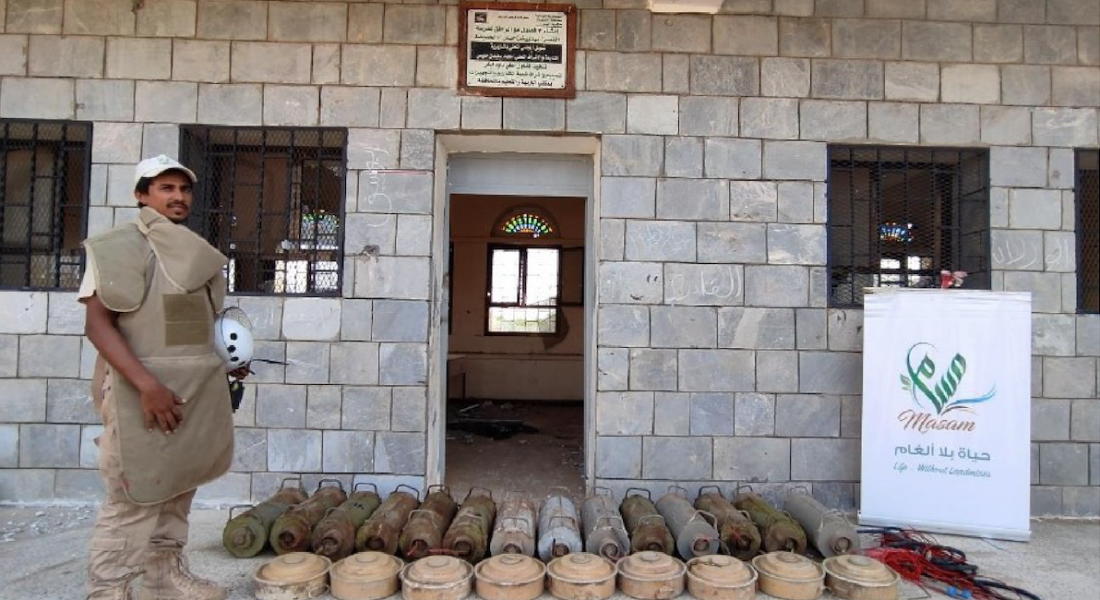Project Masam demining teams have cleared areas of landmines for the third time after Houthi militias re-planted explosive devices – even in liberated areas, the head of the project has warned.
Since the beginning of the current conflict in 2015, Houthi militias have planted landmines and improvised explosive devices (IEDs) extensively and indiscriminately across large swathes of land – meaning civilians have become targets.
In this context, Project Masam Managing Director Ousama Algosaibi, said: “All the areas where Project Masam has operated were liberated territories. However, regrettably, the Houthis continue to plant mines, even in areas we have previously cleared.
“Their strategy involves densely mining any area they enter, particularly when the frontlines shift due to their advancing and subsequent withdrawal. Currently, Masam teams are clearing certain areas for the third time due to this ongoing threat.”
He added: “The Houthis persist in planting mines and improvised explosive devices, refusing to share maps or coordinates with any party, despite having signed the Stockholm Agreement. This agreement explicitly requires the Houthis to hand over maps of mined areas, a commitment they have yet to fulfil. Until now, I don’t believe any party in Yemen, including Project Masam or the Yemeni state, has received any maps or coordinates related to the Houthis’ mine planting.”
Expert and Technical Consultant Fayez Al-Harbi indicated that the work of Project Masam’s demining teams in Yemen is focused on clearing landmines, IEDs and other remnants of war from civilian areas. This effort aims to enable Yemeni civilians to safely resume their normal lives, and to facilitate the work of humanitarian, relief organisations, and medical teams across the country.
“Project Masam teams have been able to reduce the number of casualties and restore life to many mine-cleared areas in over eight liberated Yemeni provinces,” Al-Harbi said.
This was echoed by Algosaibi, who explained that without the clearance of mines and the subsequent securing of land and people, no future development can be achieved, whether in reconstruction or in providing humanitarian support to the Yemeni people.
Algosaibi explained that Project Masam “continues its humanitarian mission in Yemen despite the significant loss of 20 demining engineers and experts.”
The managing director said that Project Masam’s achievements are evident in the number of explosives the project has removed so far since launch in June 2018.
“We are in a race against the [Houthi] militia; while we clear and demolish mines, the militia continues to expand their planting of mines in all areas under their control.”
Dr. Amin Duwaihan, an academic at the College of Education in Bayhan, meanwhile, described Project Masam’s humanitarian clearance work as “invaluable”, because the project concentrates on areas of vital importance, namely liberated numerous villages, pastures, schools, hospitals and roads.
Duwaihan also pointed out that Project Masam has served Yemen by removing and destroying mines, and by educating Yemeni society about the dangers of these potentially deadly devices. He noted that, while the project has tragically lot staff on duty, the academic described the deminers as “lifesavers” who sacrifice their lives to protect Yemen and its people.
Engineer Ali Al-Rimi, the leader of Project Masam’s demining Team 9, emphasised that the clearance of mines and remnants of war demands significant efforts and sacrifices.
Al-Rimi added that Project Masam has encountered numerous challenges on the ground, including technologically advanced mines developed by militias such as IEDs, which pose serious threats to civilians.
With this in mind, he added that the project remains committed to its ultimate goal of achieving “a mine-free Yemen,” and will persevere until this goal is achieved.

